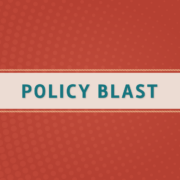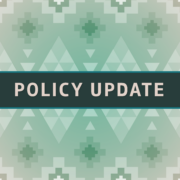NCUIH Joins Families USA and 230 other Partner Organizations in Sending a Letter to Congress to Protect Medicaid from Cuts
On April 20, 2023, Families USA, with 230 national and state partner organizations, including the National Council of Urban Indian Health (NCUIH), sent a letter to Majority Leader Schumer, Minority Leader McConnell, Speaker McCarthy, and Minority Leader Jefferies to protect Medicaid from proposed cuts amid debt limit negotiations. This letter is important to show opposition to any cuts to a critical program for the health of 91 million Americans with Medicaid coverage.
The letter highlights the need to protect Medicaid coverage as it provides healthcare access to populations that the American Healthcare System historically underserves, including 1.8 million American Indians and Alaska Natives (AI/ANs), communities of color, and vulnerable populations such as seniors and people with disabilities.
Medicaid is critical to fulfilling the United States’ trust responsibility to maintain and improve AI/AN health. Cuts to Medicaid can result in patients at Urban Indian Organizations (UIOs) having inadequate health insurance coverage or gaps in coverage may cause UIO patients to delay or avoid medical care altogether.
Full Letter Text
Dear Majority Leader Schumer, Minority Leader McConnell, Speaker McCarthy, and Minority Leader Jeffries:
As leading national, state, and local organizations dedicated to promoting the health and well-being of America’s families, we are writing to underscore the critical importance of the Medicaid program and to express our united opposition to any proposals to cut Medicaid funding as part of upcoming negotiations over the federal budget, debt limit, or any other legislative priorities. We urge you to protect this vital program from cuts or harmful changes in any budget negotiations or other legislative venue this year.
Our health should not depend on our wealth in this country. Efforts to undermine Medicaid would harm millions of families whose health hangs in the balance when they cannot get the care they need otherwise. Medicaid is a lifeline to 91 million Americans, providing insurance coverage for millions of children, veterans, and people who own and work at small businesses. The program is a critical source of coverage to people who have historically been egregiously underserved by our health care system including people of color, particularly in Black, Latino, Asian American, Native Hawaiian and Pacific Islander, and Indigenous communities, and people living in rural communities. It provides health insurance to 6.9 million seniors and over 10 million people with disabilities, and covers 54 percent of long-term care services and 42 percent of all births in the country. Additionally, more than 60 percent of adults with disabilities qualified for Medicaid without supplemental security income (SSI), largely through Medicaid expansion under the Affordable Care Act (ACA).
The evidence is clear that when people have a reliable source of high-quality health coverage, they can access critical health services, including preventive care and behavioral health services; experience improved health outcomes and better overall health; and are protected against unexpected medical expenses. After the upheavals associated with the COVID-19 epidemic over the past three years, it is clearer than ever how critical Medicaid is to our country’s health and financial well-being.
In recent years, proposals to cut the Medicaid program have been thinly disguised as policies such as “per capita spending caps,” “block grants,” “provider tax reforms,” and bureaucratic “work requirements.” Since the passage of the ACA thirteen years ago, there have been continued attempts to repeal or otherwise undermine Medicaid expansion, which covers 18 million people in 40 states and Washington D.C., many of whom would otherwise go uninsured. No matter how they are framed, the reality of these policy proposals is that they destabilize state budgets and local economies, take health care away from millions of children, older adults, working parents, people with disabilities, and people of color with cascading harmful effects on small businesses, rural communities, health care providers and others.
These ideas are not new: they were resoundingly rejected by people across the country when they were proposed as part of efforts to repeal the ACA in 2017. Unsurprisingly, the American public continues to strongly oppose them – new polling shows that 71 percent of Americans say it is important to prevent Medicaid cuts. Our collective message is as clear today as it was then: cuts to the Medicaid program are unacceptable.
Background
Medicaid: A Critical Source of Coverage for AI/ANs
AI/AN people depend upon Medicaid to receive their healthcare coverage and services. In 2020, over 1.8 million AI/ANs were enrolled in Medicaid. According to a NCUIH analysis of American Community Survey (ACS) data, in 2019 Medicaid covered 1.3 million urban AI/ANs, including 30% of urban AI/AN adults under the age of 65. Medicaid and CHIP are important programs for addressing the significant disparities in insurance coverage which exist for AI/AN people. For example, according to the Urban Institute, AI/AN children were uninsured at a rate of 8.9% in 2019, the highest rate for any ethnic group in the country. AI/AN parents were uninsured at a rate of 18.7% in 2019, the second highest rate in the country. The Urban Institute reported that in 2019, AI/AN children remained more than twice as likely as white children to be uninsured and AI/AN were more than 2.5 times more likely to be uninsured than with white parents.
Medicaid is also an important source of funding for to support the operation of the Indian Health system, including UIOs who help serve the approximately 70% of AI/AN people who live in urban areas. Medicaid remains the largest secondary source of funding for UIO clinics. In 2020, 33% of the total population served at UIOs were Medicaid beneficiaries, and 35% of the AI/AN population served at UIOs were Medicaid beneficiaries. As the Kaiser Family Foundation noted in 2017, “Medicaid funds are not subject to annual appropriation limits . . . since Medicaid claims are processed throughout the year, facilities receive Medicaid funding on an ongoing basis for covered services provided to AIANs.” Because the Medicaid program receives Mandatory appropriations, Medicaid revenue is particularly essential for Indian health providers when IHS funding is reduced or interrupted by budgetary disagreements.







Leave a Reply
Want to join the discussion?Feel free to contribute!